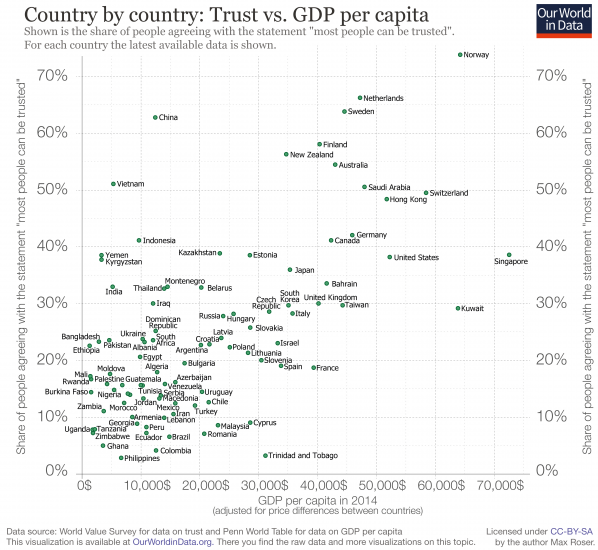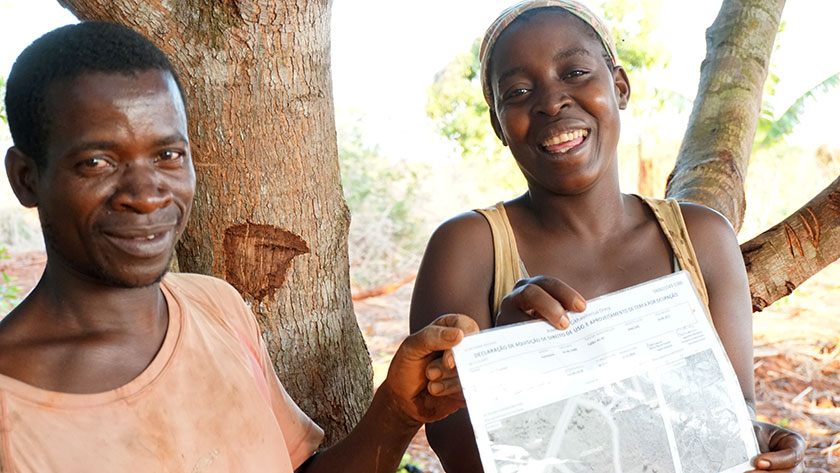Ácia and Abílio, once at odds over land boundaries, share a moment in Ácia’s field. Banner Photo: Rena Singer/World Bank
This blog was written by Paula Pimentel, Senior Agricultural Research & Technology Transfer Advisor of the USAID, Mozambique, and originally published on World Bank Blogs. The story is also available in the Portuguese language.
Researchers are increasingly recognizing the role of trust in economic development around the world.
Trust fuels economic development and a lack of trust slows it. Indeed, geographies where trust is lacking are the least economically advanced, as this next graphic illustrates.
 You’ll find many Sub-Saharan African countries crowded in the bottom left side of the graphic.
You’ll find many Sub-Saharan African countries crowded in the bottom left side of the graphic.
This is the story of how one village in Mozambique is building trust to climb out of that corner. And this story is unfolding in hundreds of villages across the region, and holds lessons for how other communities and countries can make the same ascent.
In 2018, the 4,593 residents of Meitor Mozambique established a community association called “Okaviherinwa Orera,” which means “to be helped is good” in the local language.
It was an unexpected and remarkable turn of events for a community which has a long and troubled history of violence and infighting. Augustino Mulakiwa, who leads the association, remembers the time in 1976 when a dispute over land boundaries led one resident to poison another’s well. Retributions followed from both sides of the dispute, until the dead numbered 20 people. While the high number of deceased that year was unusual, said Mulakiwa, it was in other ways very typical – conflicts over land have driven anger and violence in his community for decades as a result of insecure land rights.
Meitor residents, like those of most other farming villages across Mozambique, and Sub-Saharan Africa more broadly, farm the land their parents passed down to them or land they purchased on a handshake, its contours and boundaries only rarely noted on paper.
This lack of documentation creates conflict that costs lives and dreams.
When a handshake is not enough
This was the case for Ácia Alberto Sicanso and her husband Patrício Carlo, who bought their farm for 2,000 Meticais (about $30) on a handshake in 2014.

The problems started almost immediately when their neighbor, Abílio Alcate, planted her cassava rows about 12 feet inside the boundary of their farm. Abílio said the young couple were mistaken about the boundary. Ácia and Patrício asked the former owner to intervene. He declined to get involved. The couple appealed to Mulakiwa, who had no luck resolving the conflict.
Eventually, after lost time and harvests, the couple rented themselves out as laborers for a few days to raise the money they needed to take Abílio to court. Given that no one in this village had any documents describing their property lines, the court was unable to come to a decision.
It was deeply disappointing for Ácia and Patrício. With four hungry children, they could ill afford the lost income from the court case and the lost rows of cassava year after year.
Technology steps in
Relief came in 2017 when USAID and DFID began efforts to document farmers’ land in the area. Through the programs, USAID and its partners train villagers to map property boundaries with the help of handheld GPS devices. Together, neighbors walk the perimeter of their farms, noting GPS coordinates to create a digital map. Each farmer receives a document that notes their farm’s description, location, owner and names of witnesses. USAID’s program, which is ongoing in Mozambique, Zambia, Ghana, and India, has already documented the land rights of tens of thousands of farmers.
Documenting boundaries strengthens communities
Land documentation has proved transformative for Ácia and the community as a whole. Ácia and her neighbor Abílio, who likewise has her own land certificate, now can share a laugh when they see each other in the fields.
And the community has held ceremonies to mend relationships between other formerly feuding neighbors.
Documentation, said Mulakiwa, has planted seeds of trust in the community. And with that trust comes opportunities for cooperation. Today, the community association is discussing implementing community improvement projects, such as a mill, to which they can all commit their time and resources.

